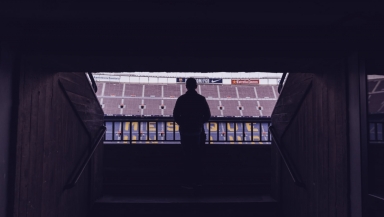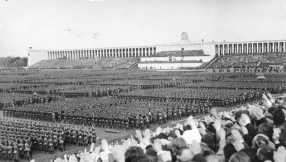
England's victories in Euro 2020 are to be tested again in Wednesday's semi final. But last week's win against Germany (and the reaction in that country) brings back memories of my own experience in the country in 1966.
In those days, languages were very important in schools, and our Liverpool school was no exception. Many of us had already stayed with penfriends in Paris, and just before our O level exams, quite a few opted to spend time with penfriends in Germany.
My penfriend was called Beate (which means 'blessed') and all was going swimmingly, as we increased the pace of our letters, leading up to my summer visit to Germany. In April, Beate wrote gushingly about that year's Easter experience, which had included bunny hunts in the garden, all sorts of chocolate treats, and parental surprises planted all over the place.
I answered in kind – responding that at Pesach (Passover), we had also eaten interesting food, but in our case it had been bitter herbs (known as 'chrein'), parsley, hard-boiled eggs, and definitely no lamb, as we remembered our Exodus from Egypt, all through G-d's redemptive hand.
Beate's response? Stony silence, zilch, nada, nothing. Later, Beate's mother wrote to my Liverpool school and informed them that I wouldn't be welcome as their guest come summer.
Was I devastated? Not at all. I had expected it all along – and often later in life, have used that same ploy. People tell me about their Easter – I respond with my Pesach – and the response often speaks volumes.
So, my wonderful head teacher, Miss Walsh (now Mrs Davies, and still going strong at 94) got to work, and found me Sybille, the daughter of an Anglophile university professor, located in a pretty village in the centre of West Germany.
Sybille's father, a truly eminent professor it seems, had recently returned from an exchange visit to Oxford University and was regarded by my school as a suitable host for the daughter of Holocaust survivors, whose mother, in addition, was currently receiving reparations from the German government.
Well, things couldn't have gone better. I was from Liverpool – at that time, the top of the world as the Beatles had just written 'Penny Lane', which I took as a gift for my penfriend (with 'Strawberry Fields' on the other side).
And my stay ....? Sheer paradise. I didn't learn much German, but was invited to play their incredibly grand piano whenever I wished, and was treated to the professor's account of what his father had done in the War. His father had been an admiral, but apparently very fair-minded, often smuggling in English-language newspapers at the height of the Shoah, in order to enlighten his children, including my host, as to what the Allies thought about things (probably, in hindsight, most unlikely – but at that stage I was more naïve than I am now).
I listened intrigued and thought 'this is definitely the new Germany' – even though I was hearing through the grape-vine that my classmates were having a terrible time with their own hosts – bed at 6.00pm on the dot, no make-up, the Beatles definitely taboo, and as for the War ....
And then it happened – July 30<sup>th, to be exact, England had apparently just beaten Germany in the FIFA World Cup – and that was it. The mask dropped – the temperature rose, and I was bundled onto the first plane out. There was no question; I was blamed fair and square for England's win against Germany – WWII all over again, and German ire against me was huge. Somehow, it seems, I had personally and very deliberately betrayed my hosts – and the response to betrayal is .....
And was I even interested in football? Not really. Our family certainly supported Manchester United – Dad was in any case a sport fanatic, having been a member of the Polish national table-tennis team, until forced to flee in 1938, and the rest of the family were exterminated.
But football was one of Dad's great loves and the tragic 1958 Munich Air Crash was never much out of our minds, what with the death through accident of the 'Busby Babes'.
But as for me, I had up until then regarded football as not of supreme importance, and was indifferent to the progress of the 1966 World Cup. But in the second that the mask dropped from off the face of my host, I realised that football is simply a substitute – for war, for religion, for proper personal relationships, you name it.
And the idolatry that has grown up around football since 1966 is an indictment of our age, in which our religious leaders no longer lead, and football has simply filled in the gap.
There are of course two sides to this question.
The beautiful and wistful film 'The Cup', made by a Tibetan lama in India, tells the story of novice refugee lamas from Tibet who want to watch the World Cup, but do not possess a TV in their monastery. Eventually, though, things are sorted out to everyone's satisfaction.
Although more experienced lamas simply don't understand why people become ecstatic about a ball being pushed around by feet – the goal seemingly being one of 'scoring', i.e. using footwork to manoeuvre the ball into a net - their innate kindness, worked on through daily discipline, eventually wins the day. Although the lamas will never quite understand the enigma of 'football', they nevertheless allow their novices to have a bit of fun on the big day.
What I experienced in Germany as a young teenager in July 1966 was the opposite of Buddhist kindness and of 'losing gracefully.'
If we follow the Jewish calendar, this week's UEFA match falls in the three-week period when we mourn the Destruction of the two Temples, leading up to the New Moon of Av, when we finish reading the Book of Numbers and turn to Deuteronomy.
The prophet Isaiah reminds us that despite what the pundits are saying, redemption comes only from G-d, and the term 'semi-god' is most inappropriate as a description of mortals, however skilled in their own particular sphere they may be.
The 'myth' popular in German art, literature, music and philosophy, that 'man' can master the entire world of knowledge and power and still remain a mensch (human being), is wrong. For, as it says in this week's reading from Isaiah chapter 66:
'The heavens are My throne and the earth is 'My footstool.... My hand made all these and this is how they came into being..... But what is it that I actually look for? For the poor and broken-spirited person who trembles in awe of My word.'
As the Tibetan exiled in India came to realize, by all means enjoy sport, but don't elevate it beyond what it is. Winning a match, even the European Championships, should be seen in perspective. Yes, wins give us a national boost, no doubt much appreciated after the last 18 months. But, we should never ever forget that there is G-d Who is greater than us, an all-seeing G-d, for whom the broken person, full of self-doubt, who nevertheless strives to do G-d's word even in the most straitened of circumstances, is far greater in G-d's eyes than those who live for glittering prizes. And it is only G-d who brings redemption, not mere mortals!
A pity that in the 75 years since the end of the Shoah, these lessons simply don't seem to have been learned.
And of course, I hope with the rest of the UK that the English side wins on Wednesday. But, if they don't, it won't be the end of the world!
Dr Irene Lancaster is a Jewish academic, author and translator who has established university courses on Jewish history, Jewish studies and the Hebrew Bible. She trained as a teacher in modern Languages and Religious Education.













